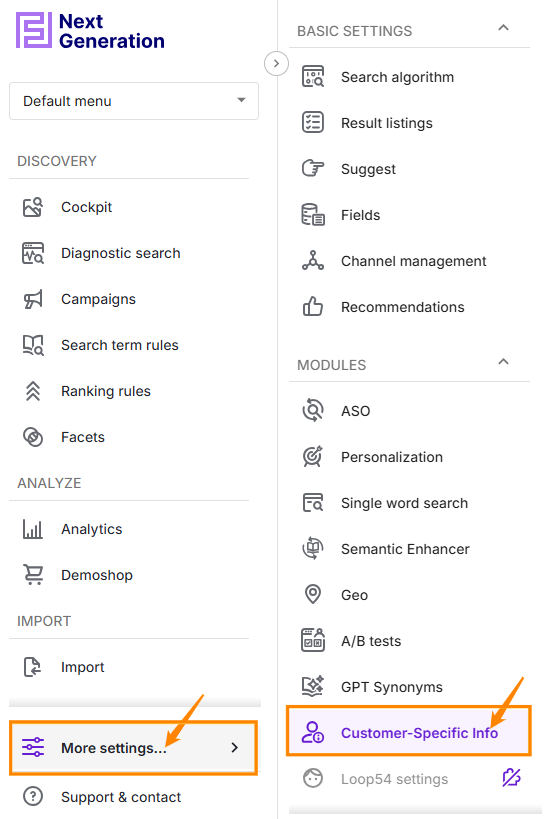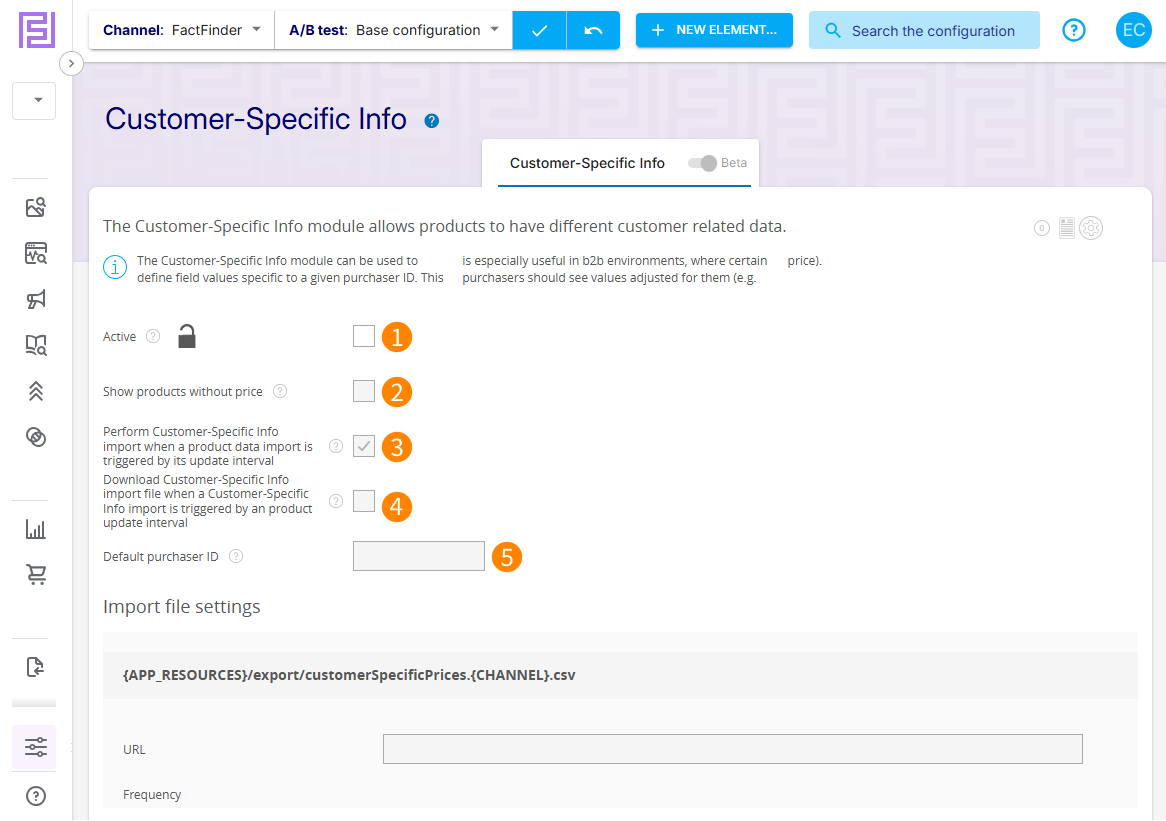The Customer-Specific Info module (CSI) gives you the option to display individualized prices and other individualized information on a by-customer basis. This is primarily aimed at B2B business customers with a low number of customers with a high rate of purchases.
Customer-Specific Info module can be found in left side menu, next to More setting…→ Customer-Specific Info in Modules category:


You can activate or deactivate CSI for individual channels (1) or inherit the setting from parent to child channel. You can configure that products without price will be shown in the serch result (2). Imports can either be performed separately or can be linked to the default database import (3). Using (4) you can define if each CSI import will also trigger a download of the CSI CSV file. It is also possible to only use Purchaser IDs for specific customers or items. In that case, you may set a default purchaser ID (5) that decides what price to use, should no bespoke ID be handed over in a search query. Import settings are identical to the product database import.
Please note that the CSI module can only be activated when a CSI import source has been defined for a corresponding ID field.
The CSI export file:
CSI expects its own export file in .CSV format. This should contain one column with the product number, and additional columns with the mappings for "purchaserId" to the respective value.
To use MasterIds and ProductIds at the same time, all corresponding columns may be filled in one row, or in one row the MasterId and non-variant fields, and in a subsequent line the product number with variant mappings. In the latter case, the columns for the "other" ID remain empty.
Example File Formats
Header (where "
price" is a variant field, and "masterPrice" is a non-variant field):
masterId;productId;price;masterPrice- all in one line:
1234;1234-56;1=9.99|2=9.73|4=9.55;1=4.99|5=7.99- Separated values for MasterId and ProductId:
1234;;;1=4.99|5=7.99;1234-56;1=9.99|2=9.73|4=9.55;
The field separators may be set using the CSI settings. There should always be exactly one (1) header line.
If there is no individual value for a given product, or for a specific "purchaserId", the value should simply be omitted. However, in this case the corresponding field should be assigned a default value in the data import, otherwise the result may be an empty field. FactFinder will not indicate such discrepancies during import.
Importing CSI data
CSI requires its own import, which can be performed only when a Worldmatch database already exists, meaning that a data import has been processed successfully. If the Worldmatch database is recreated by a data import, then a new CSI import is also required.
If the CSI module is (later) deactivated, then a new data import must be performed, in order to remove the individualized values from the Worldmatch database (an import from the intermediate database is sufficient). CSI employs an intermediate database (just like the product data import), which may become persistent when using Postgres.
While products that do not have a value in the "price" field are normally not accepted during a data import, this field may be empty in the data export when that field is a "customer specific" field (see the section on "customer specific" fields). FactFinder does not check whether the price import adds a field value for each and every product + purchaserId combination. For this reason, if the database does not always fill this field, it may occur that a product may not have a price for a particular customer. The CSI import may also be scheduled at set intervals (just like the product data import). However, it is also possible to attach the CSI import to the scheduled product data imports. This will prevent unnecessary cache clearances, and ensures that correct prices will be available as quickly as possible after the data import has been performed, without having to manually match the import schedule. To use this feature, activate the setting "importInProductUpdateInterval". This will start a CSI import whenever a scheduled product data import has been successfully completed.If auto-import is enabled for the CSI channel upon FactFinder startup, a CSI import will be executed after the successful data import. If a CSI import is started, and the Worldmatch database has not yet been created, a product data import will be triggered before the CSI import is performed.
Other Imports
If the import is to be performed for a module that is dependent on another import (and this import has not been started yet), then the other import will be triggered automatically.